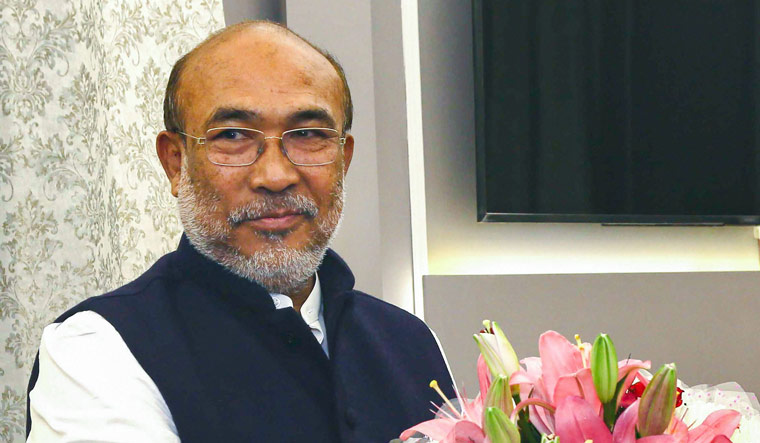
Biren Singh blames immigrants, drug menace for Manipur riots; here’s a factcheck

Manipur Chief Minister N Biren Singh, in a recent media interview, blamed illegal immigrants from Myanmar and the apparently related issue of drug menace for the violence that has left the state shattered for three months now.
While the official media version has blamed the genesis of the violence on a “tribal solidarity rally” held by the tribal Kukis against the non-tribal Meiteis getting Scheduled Tribe status, it has not been clear how it blew up into such mammoth proportions that has left some 60,000 people homeless, scores dead, hundreds injured, and many women raped and molested.
Even as questions are continuously raised about the “real” reason(s) behind the Manipur violence, how far are Biren Singh’s explanations believable? The Federal does a factcheck.
Also read: SC seeks broad mechanism to deal with violence against women in Manipur
Illegal immigrants as one of the root causes of Manipur riots
A crucial question in this context is how and why a “tribal unity rally” went so violent that the fire has not been doused in three months. According to Singh (as well as the majority Meiteis), the violence has been fuelled by illegal migrants from the neighbouring Myanmar who are also into illegal narcotics trade.
What Singh said in the interview (translated): “A large number of people have illegally migrated into Manipur from our border area with Myanmar. Their numbers are increasing in the rural areas in the southern districts of Manipur (where the Kukis live). Moreover, due to the current military rule in Myanmar, this illegal immigration has increased manifold. The migrants are engaged in the cultivation of poppy, an intoxicating crop, in the protected forests of Manipur. They are being protected by some groups there.”
He added: “The state government is taking strict action against these illegal settlements, cultivation of narcotic crops, and encroachment of forest areas. The state government started the war on drugs in 2017 when I took charge as the Chief Minister.”
Also read: Manipur situation ‘grave’: Opposition MPs brief INDIA alliance parties
What we found out
Though Singh has tried to project the influx of illegal immigrants as a serious threat to Manipur’s demography, a house-to-house drive conducted by the state government could detect only 2,477 illegal immigrants.
The theory of demographic change is based on notional figures. An estimated 40,000 ethnic Chin refugees from Myanmar took refuge in the neighbouring Mizoram, a state that has recorded the maximum intake. There is nothing to suggest that the number of Myanmarese refugees in Manipur is more than that of Mizoram.
Moreover, the claim that the migrants are engaged in poppy cultivation in the protected forests of Manipur is also not backed by any definitive figure. Poppy cultivation in the hilly areas of Manipur has been going on for about a decade, if not more. Singh himself has stated in the interview that his government’s crackdown against the poppy cultivation started in 2017. The Chin refugees started fleeing to India to escape repression in their homeland following the February 2021 military coup in Myanmar.
Also read: Manipur violence took everything we had: India footballer Chinglensana Singh
On his government’s war against drugs as the other root cause of violence
Singh said there has been a conflict between the state government and drug terrorists in Mnaipur. To date, his government has cleared more than 18,600 acres of cultivated land of narcotic crops, he said. “Drugs, including 275 kg of heroin, 1,750 kg of opium, and 1,100 kg of brown sugar, were seized. Their value in the international market is Rs 4,600 crore,” he claimed in the interview.
Singh added that 2,518 people have been arrested under the Anti-Narcotics Act since 2017. “This move by the government has severely affected those involved in the drug trade. So, the answer to the question of what is the cause of the violence in Manipur — if you correlate these with the state government’s actions against illegal immigration, drug trafficking, drug cultivation, and forest encroachment — you will understand the reason for the violence in Manipur,” he said.
“We believe that those protesting this move by the government are playing a major role in the violence. Drugs are harmful to all communities. So, the war on it is not against any community. Of the 2,518 people arrested, 873 were Kukis, 1,083 were Muslims, and 381 were Meiteis. The rest belong to other communities,” he added.
Also read: Help me see husband, son’s bodies: Mother of woman paraded naked in Manipur urges Oppn MPs
What we found out
The so-called war against drugs in Manipur was launched in the state in 2017 after Biren Singh took over as the chief minister. For all these years, no community has opposed or resisted the drive. The only complaints against the drive from certain quarters, as widely reported in the media, has been about the alleged protection certain drug kingpins enjoyed from those close to power.
A decorated police officer associated with the “war against drugs”, Thounaojam Brinda, had accused powerful people in the government of pressuring her to release an accused in a drug smuggling case in 2020.
The Coalition Against Drugs and Alcohol (CADA) had in February demanded that the state government launch a probe into the Itocha International Drug Cartel whose two members were arrested by Delhi Police.
The cartel had been reportedly smuggling drugs from Manipur to other parts of the country, including Delhi and Punjab, for the past five or six years.
“The people of Manipur truly believe that there are very well connected and very powerful political families involved in the menace of drugs business in Manipur,” sitting MLA Kh Raghumani Singh wrote to Union Home Minister Amit Shah on May 19 this year.
Until recently, it was the political elites who had been blamed for the Manipur drug menace and not “illegal migrants” or any particular ethnic group.

